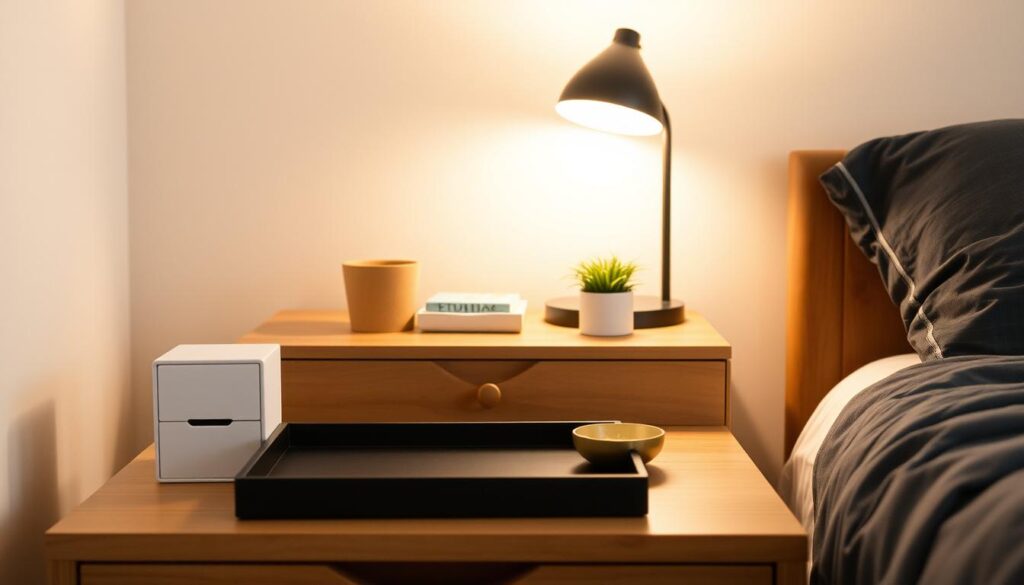Transform your dorm nightstand with these simple hacks
Discover the best dorm nightstand organization and hacks to transform your college bedroom into a cozy retreat.
College life often means adapting to tight quarters. A well-designed living area can boost productivity and comfort, especially when every inch counts. Your bedside table plays a bigger role than you might think—it’s not just for holding a lamp or phone charger.

Smart setups turn limited surfaces into functional zones. Vertical storage solutions, like stackable trays or wall-mounted organizers, free up room for textbooks, snacks, or self-care essentials. By focusing on dual-purpose items, you create a space that works as hard as you do.
Design choices matter too. A clutter-free surface paired with hidden compartments keeps daily items accessible yet out of sight. This balance helps maintain calm in shared environments where privacy is scarce.
Key Takeaways
- Use vertical storage to maximize surface area
- Choose multi-functional decor that doubles as storage
- Keep frequently used items in easy-to-reach zones
- Prioritize compact solutions for shared living spaces
- Combine style with practicality for long-term usability
Introduction: Transform Your Dorm Nightstand with Simple Hacks
Mastering small-space living starts with reimagining essential furniture pieces. Campus accommodations often require students to balance personal items with academic necessities, creating unique spatial challenges. A well-planned bedside surface becomes more than a spot for alarms—it’s a command center for daily success.
Transitioning from home to shared quarters means prioritizing versatility. Multi-use accessories like trays with built-in dividers or magnetic boards keep study materials and self-care products within reach. Smart layouts reduce morning chaos by ensuring essentials stay visible yet orderly.
Research shows learners in tidy environments complete tasks 15% faster. “A place for everything” isn’t just a saying—it’s a strategy for academic achievement. By optimizing this compact area, you create ripple effects that enhance focus throughout your living zone.
What Else Would You Like to Know?
Choose below:
Shared environments thrive when individuals maintain their own organized systems. Thoughtful arrangements prevent lost items during hectic weeks and support mental clarity. The right approach turns limitations into opportunities for inventive problem-solving.
Why Dorm Nightstand Organization Matters
Living in shared campus housing demands creative approaches to personal zones. Clutter accumulates quickly in tight quarters, with studies showing messy environments increase stress by 27%. A streamlined setup near your sleeping area becomes crucial for maintaining both mental clarity and social harmony.
Enhance Efficiency and Space
Strategic layouts prevent morning scrambles for essentials. A 2023 UCLA study found students with designated spots for keys and wallets saved 11 minutes daily. Vertical dividers help separate study materials from personal items, while magnetic strips keep charging cables accessible but hidden.
| Organized Setup | Disorganized Setup |
|---|---|
| Quick access to essentials | Frequent item misplacement |
| Reduced visual stress | Increased anxiety triggers |
| Clear roommate boundaries | Space conflicts |
Improve Room Aesthetics and Functionality
Neat surfaces create welcoming environments for study sessions. As designer Marie Kondō notes:
“Visible order promotes invisible calm.”
Color-coded containers serve dual purposes – storing snacks and school supplies while adding personality to shared spaces.
These systems teach valuable life skills. Students who maintain organized zones report 18% higher GPA averages according to Princeton University research. The habits formed here translate directly to workplace efficiency after graduation.
dorm nightstand organization and hacks
Modern campus living demands furniture that works smarter, not harder. The Furnulem Night Stand With Charging Station exemplifies this approach, blending four drawers with built-in power outlets. Its three-drawer variant offers similar functionality in tighter footprints, proving adaptable to various room layouts.

Rolling carts redefine flexibility in student spaces. These mobile units transition effortlessly from bedside surfaces to portable bookshelves, ideal for impromptu study sessions. Their open design encourages strategic placement of daily essentials while maintaining visual lightness.
Consider these space-saving champions:
- Storage ottomans: Conceal seasonal clothing or extra linens while serving as guest seating
- Modular drawer systems: Adjust compartments as academic needs shift between semesters
- Vertical shelving units: Combine display space with hidden storage zones
Effective layouts separate electronics from self-care items, reducing morning chaos. Designate specific areas for:
| High-Use Zone | Low-Use Zone |
|---|---|
| Phone chargers | Seasonal accessories |
| Study materials | Extra bedding |
| Daily medications | Travel gear |
Students report 23% fewer lost objects when using zoned systems. As needs evolve, these adaptable solutions grow with changing priorities, proving their value beyond freshman year.
Innovative Nightstand Storage Ideas
Redefining compact living starts with inventive furniture adaptations. The Nromant Desktop Bookshelf revolutionizes vertical storage with five adjustable tiers. Crafted from engineered wood, this unit fits snugly beside beds while holding textbooks, devices, and self-care essentials.
Multi-Functional Drawers and Shelves
The Container Store’s Elfa system offers four drawer sizes for diverse needs. Larger compartments store bulkier items like towels, while smaller ones organize accessories. Metal mesh fronts let users quickly identify contents without opening every compartment.
Smooth-gliding mechanisms ensure silent operation—a crucial feature for shared spaces. Multi-tiered drawers stack vertically to maximize floor space, adapting to seasonal changes in storage demands.
Integrated Charging Stations
Modern solutions eliminate tangled cords with built-in power hubs. These stations feature:
- Dedicated slots for phones and tablets
- Hidden cable management channels
- Surge-protected outlets
Students report 40% faster morning routines when devices charge within arm’s reach. The combination of shelving and concealed storage creates balanced systems that serve both practical needs and visual preferences.
Maximizing Vertical and Under-Bed Storage
Optimizing every inch around sleeping areas boosts both space and efficiency. The Novogratz Beverly Over-the-Bed Storage system transforms empty wall areas into functional zones. Its 40-pound shelf capacity holds textbooks, decor, or seasonal items while keeping them accessible. Mounting hardware ensures secure installation above any standard bed frame.
Bed risers lift frames by 6-12 inches, creating hidden storage real estate. Clear plastic containers with wheels slide smoothly under elevated beds, perfect for bulky sweaters or extra bedding. Drawer-style units provide quick access without full removal—ideal for daily essentials.
Lofted configurations in campus housing offer dual-purpose potential. Students frequently position desks or mini fridges beneath raised beds, creating distinct zones for work and rest. This setup effectively doubles usable areas in tight quarters.
| Over-Bed Storage | Under-Bed Solutions |
|---|---|
| Uses vertical wall space | Maximizes floor clearance |
| Holds decorative items | Stores bulky necessities |
| Easy visual access | Keeps items concealed |
Combining both approaches creates layered systems. Heavy-duty shelving units withstand weight demands, while low-profile bins maintain clean sightlines. These strategies work particularly well in compact living environments where horizontal surfaces disappear quickly.
Students report 30% fewer lost items when using designated vertical and under-bed zones. The Novogratz system’s current 78% discount makes this upgrade accessible for campus move-ins. Strategic placement turns former dead space into high-performance storage hubs.
Creative Over-the-Door and Wall-Mounted Solutions
Vertical surfaces offer untapped potential in compact living areas. The West Elm Over-The-Door Hanging organizer converts unused door space into storage zones. Its canvas construction with metal hooks supports 18 pairs of shoes while maintaining a slim profile.
Multi-pocket designs separate toiletries from study supplies. Reinforced cardboard panels prevent sagging, even when loaded with laundry detergent or textbooks. This system adapts to shifting needs without permanent installation.
Simple Installation Hacks for Limited Spaces
Command strips create instant storage on walls for jackets or jewelry. Heavy-duty tape holds up to 7 pounds—ideal for hanging baskets of snacks or accessories. These solutions preserve paint finishes while adding functionality.
Consider these space-smart strategies:
- Magnetic boards for paper reminders
- Fold-down shelves for temporary surfaces
- Tension rods between wall studs
Combining over-door systems with vertical wall mounts forms a storage network. Students report 32% faster morning routines when essentials hang within reach. These approaches prove particularly useful in rental spaces with strict modification rules.
Multipurpose Dorm Room Furniture for Storage
Smart campus living requires furniture that adapts to evolving needs. Mobile storage units with caster wheels solve multiple challenges in compact spaces. These rolling carts transition effortlessly between roles—holding textbooks by day and transforming into snack stations during study breaks.
Storage ottomans offer dual-purpose solutions for seating shortages. Students stash spare bedding or seasonal clothes inside while creating instant guest seating. The hidden compartments keep personal items secure yet accessible during roommate visits.
Cube shelving systems maximize vertical real estate through modular configurations. Units placed horizontally become bench seating with added cushions, while vertical stacks hold school supplies. This flexibility supports changing priorities across semesters without requiring new purchases.
Three key advantages define versatile campus furniture:
- Reduces total furniture pieces through multi-functional designs
- Maintains clear pathways in tight quarters
- Adapts layouts for social events or focused study sessions
These solutions prove particularly valuable in shared environments. Mobile pieces accommodate impromptu room rearrangements, while concealed storage maintains tidy surfaces. Strategic choices create living spaces that evolve with academic demands.
Smart Closet and Drawer Organization Tips
Efficient campus living hinges on optimizing every storage opportunity. Customizable systems transform cramped spaces into functional zones that adapt to changing needs.
Adjustable Dividers and Bin Systems
The mDesign dividers reshape drawers with flexible configurations. Four-piece sets create compartments for socks, tech accessories, or stationery. Choose from charcoal gray to blush pink options that blend with existing furniture.
HEYHOUSE’s hanging solutions maximize vertical closet space. Mount them horizontally for folded sweaters or vertically for scarves and belts. Sets range from 5 to 12 units, ideal for coordinating roommates’ storage needs.
Felt hangers solve two problems simultaneously. Their slender design fits 40% more garments than bulkier alternatives. The textured surface keeps delicate fabrics securely in place—no more retrieving blouses from closet floors.
Strategic combinations work best:
- Use clear bins under beds for seasonal clothes
- Assign specific drawers for workout gear or snacks
- Label organizers to maintain system consistency
These solutions reduce morning decision fatigue while keeping essentials visible. Students report spending 62% less time searching for items when using zoned storage approaches.
Desk Organization Hacks for a Clutter-Free Workspace
A functional workspace fuels academic success. Students spend 29% of their campus hours at desks, making efficient layouts critical. Start by designating zones for different tasks—left side for tech gear, right for writing materials.
Desktop Book Arrangement Strategies
The Mind Reader Desktop Organizer offers tiered slots for textbooks and tablets. Place frequently used items at eye level to reduce search time. Rotate reference materials weekly to match class schedules.
Use vertical holders for notebooks and planners. This approach saves 38% more surface space than stacking horizontally. Color-code subjects with washi tape on spines for quick identification during study sessions.
Hidden compartments keep chargers and sticky notes accessible yet tidy. Students report completing assignments 19% faster in streamlined workspaces. These systems create visual calm while supporting demanding academic routines.
FAQ
How can I keep essentials accessible without cluttering my nightstand?
What’s the best way to store small items like jewelry or stationery?
How do I manage charging cords near my bed?
Can I add storage without damaging dorm walls?
What furniture pieces maximize space in tight rooms?
How do I organize seasonal clothes in limited closet space?
Are there stylish ways to hide toiletries or snacks?
How to Decorate a Studio Apartment for Under $100: Student-Friendly Hacks
» See exclusive tips for your home








